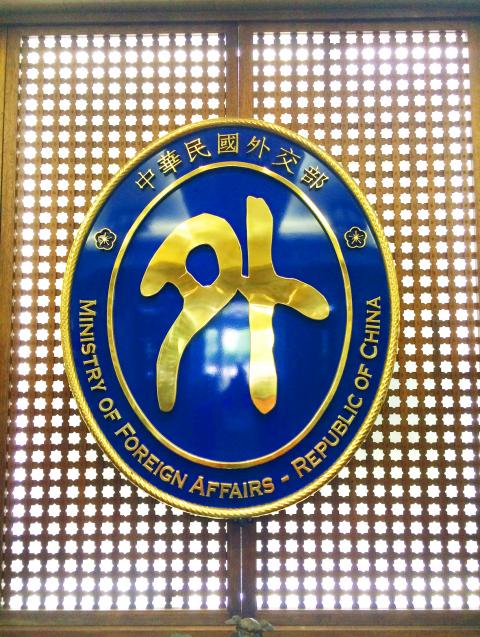The sale of F-16V jets by the US to Taiwan has not been put on hold, the Ministry of Foreign Affairs said yesterday, denying a US media report that the administration of US President Donald Trump has temporarily set aside the sale to facilitate a trade agreement with China.
Taipei has maintained close communications with Washington since a letter of request to purchase the jets was submitted to the US, ministry spokesman Andrew Lee (李憲章) said.
The US is conducting a review and “the sale has not been shelved,” Lee said.

Photo: Lu Yi-hsuen, Taipei Times
The ministry’s comments came in response to a Time magazine report on Friday that said — citing three anonymous US officials — that the administration had shelved the sale until a trade deal with China is sealed.
The White House’s initial decision, reported late last month, to offer tacit approval for Taiwan to buy 60 Lockheed Martin F-16Vs was widely seen as a US show of strength against China, Time said.
However, the decision to delay approval of the sale has contributed to concern among some in the administration that Trump might go soft on China in his desire to secure a trade deal, it said.
It cited the officials as saying that the draft trade agreement being negotiated would boost Trump’s political fortunes and ease jittery stock markets, but it is unlikely to address many of the issues at the core of the US-China trade dispute.
The US Congress must also approve any arms sales to Taiwan, and the administration has yet to submit such a request to lawmakers, the magazine said.
The US Department of State, which opposed the proposed arms sale, has also called for an interagency meeting to determine whether the US can sell M1 Abrams tanks to Taiwan, Time quoted an administration official as saying.
However, Lee said that the relationship between Taiwan and the US has been close and cordial.
“Since President Trump’s inauguration, the US has sold arms to Taiwan twice, demonstrating its firm support for Taiwan’s security,” Lee said.
High-ranking US officials have publicly reiterated their support for the Taiwan Relations Act (TRA), he added.
Signed into law on April 10, 1979, following Washington’s switch of recognition from Taipei to Beijing, the TRA authorizes the US to provide Taiwan with defensive arms.
The Ministry of National Defense yesterday said that the Time report was not based on fact and that US arms sales to Taiwan are in accordance with the TRA and the “six assurances.”
The American Institute in Taiwan said it does not comment on proposed arms sales.
“We only comment after they have been notified to Congress,” the institute said.

Seventy percent of middle and elementary schools now conduct English classes entirely in English, the Ministry of Education said, as it encourages schools nationwide to adopt this practice Minister of Education (MOE) Cheng Ying-yao (鄭英耀) is scheduled to present a report on the government’s bilingual education policy to the Legislative Yuan’s Education and Culture Committee today. The report would outline strategies aimed at expanding access to education, reducing regional disparities and improving talent cultivation. Implementation of bilingual education policies has varied across local governments, occasionally drawing public criticism. For example, some schools have required teachers of non-English subjects to pass English proficiency

‘FORM OF PROTEST’: The German Institute Taipei said it was ‘shocked’ to see Nazi symbolism used in connection with political aims as it condemned the incident Sung Chien-liang (宋建樑), who led efforts to recall Democratic Progressive Party (DPP) Legislator Lee Kun-cheng (李坤城), was released on bail of NT$80,000 yesterday amid an outcry over a Nazi armband he wore to questioning the night before. Sung arrived at the New Taipei City District Prosecutors’ Office for questioning in a recall petition forgery case on Tuesday night wearing a red armband bearing a swastika, carrying a copy of Adolf Hitler’s Mein Kampf and giving a Nazi salute. Sung left the building at 1:15am without the armband and apparently covering the book with a coat. This is a serious international scandal and Chinese

TRADE: The premier pledged safeguards on ‘Made in Taiwan’ labeling, anti-dumping measures and stricter export controls to strengthen its position in trade talks Products labeled “made in Taiwan” must be genuinely made in Taiwan, Premier Cho Jung-tai (卓榮泰) said yesterday, vowing to enforce strict safeguards against “origin laundering” and initiate anti-dumping investigations to prevent China dumping its products in Taiwan. Cho made the remarks in a discussion session with representatives from industries in Kaohsiung. In response to the US government’s recent announcement of “reciprocal” tariffs on its trading partners, President William Lai (賴清德) and Cho last week began a series of consultations with industry leaders nationwide to gather feedback and address concerns. Taiwanese and US officials held a videoconference on Friday evening to discuss the

PERSONAL DATA: The implicated KMT members allegedly compiled their petitions by copying names from party lists without the consent of the people concerned Judicial authorities searched six locations yesterday and questioned six people, including one elderly Chinese Nationalist Party (KMT) member and five KMT Youth League associates, about alleged signature forgery and fraud relating to their recall efforts against two Democratic Progressive Party (DPP) legislators. After launching a probe into alleged signature forgery and related fraud in the KMT’s recall effort, prosecutors received a number of complaints, including about one petition that had 1,748 signatures of voters whose family members said they had already passed away, and also voters who said they did not approve the use of their name, Taipei Deputy Chief Prosecutor